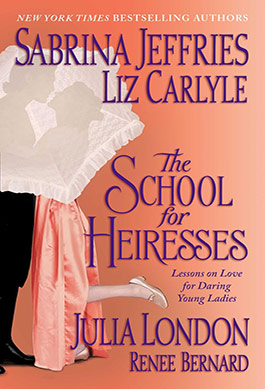
The Dangers of Deceiving a Viscount
The Desperate Debutantes, Book 3
Historical Romance
October 23, 2007
978-1416516170
Lady Phoebe Fairchild is well aware that the ton would be appalled to learn of a young lady of quality involved in a trade. Therefore, she resorts to selling her beautiful handmade gowns under a fictitious name: Madame Dupree. So when circumstances force her to visit the estate of William Darby, the Viscount of Summerfield, to design ball gowns for his sisters, she assumes Madame’s identity. Phoebe’s discomfort in her new position as hired help is nothing compared to her visceral attraction to the viscount himself. Heathenishly handsome and shamelessly seductive, Will invites her to be his mistress—and Phoebe is shockingly tempted to accept. But as their desire for one another grows, and the risk of exposure becomes even greater, Phoebe is in dire danger of losing her reputation, her livelihood—and her chance of becoming the bride of the man whose passion has claimed her forever.
William Darby, Viscount Summerfield, Baron Ivers, rode the last mile to Wentworth Hall full bore. The letter from his father’s secretary was in his breast pocket, stained red by the sands of the Egyptian desert, smelling of salt from the passage across the Mediterranean, and tattered at the folds from Will’s frequent reading of it.
The earl has suffered a terrible fit of apoplexy that has left him paralyzed. You are needed at home, sir.
In the six years since Will had left Wentworth Hall to take his grand tour of Europe—a tour his father had urged a restless young man of two and twenty to take before duty and responsibility claimed him—he’d received many letters from his father. In the first two years, those letters had exulted in the sights Will had seen and the adventures he’d experienced, as related weekly in a letter home. The tour was supposed to have at two years, but Will had gone on to India instead of coming home as expected, and his father’s letters had changed in tone. While the earl still enjoyed the tales of Will’s travels, he often reminded him of his responsibility to his family and as the future Earl of Bedford, and asked him to come home.
Will always wrote that he would, and truly, he always meant to come home. But invariably, he’d meet a fellow traveler who would feed his wanderlust with a tale of the Himalayas or searching for treasure in the oases of Africa, and Will would be off again.
In the last two years, his father’s letters had cajoled and pleaded with Will to come home and marry as he ought, to provide an heir before it was too late, before the earl was gone. His father professed a longing to hold his grandchild in his arms. Will was confident he would fulfill that wish, but as he was only eight and twenty, he believed there was ample time for marrying and fathering children.
Then had come the last letter from Mr. Carsdale, the earl’s secretary. It was delivered to Will in a Bedouin tent by his loyal manservant Addison, who had been with him since his eighteenth year and had traveled the world with him regardless of whether he liked it or not. Addison had come from Cairo on a Bedouin train and was wearing a kaffiyeh wrapped around his head, his clothing and eyes red from the stinging sand. When Will read the letter, the words seemed to sag on the vellum under the weight of what they related.
He left Egypt at once, of course. He’d taken the arduous Bedouin route to the sea, had booked passage on a ship that sailed through a stormy sea and Straits of Gibraltar that had almost cost him his life when the clipper was shipwrecked. It had taken him three months to reach England’s shores. Another week was spent purchasing a horse and arranging to have his things and Addison sent to Wentworth Hall, and another week riding across the rain-soaked English countryside.
At last, Will and Fergus—the Welsh pony he’d acquired—were riding up the lane to the majestic hall that had housed his ancestors for centuries. The sight of the mansion warmed his heart—built in the shape of an H, it stood four stories tall. Ivy covered the corners, and row upon row of six-foot paned windows looked out across the woodlands, the deer park, and the fields where the estates’ sheep and cattle grazed.
He reined to a hard stop in the drive, surprised that no footman or groom hurried to attend him, and frightened him the more he thought of it. Will flung himself off Fergus, shoved his cloak over his shoulder and reached for the letter. Clutching it in his gloved hand, he vaulted up the steps to the double-door entry, flung them open, and strode inside.
The foyer was empty. Completely empty—devoid of furniture and accoutrements. The only things left were the very large paintings of mythical scenes that filled an entire wall. Will walked on, vaulting up the stairs to the family rooms on the first floor. But as he reached the first floor landing, he stopped, unable to comprehend what he was seeing. A broken chair was lying on its side. Papers were strewn across the carpet as if they’d been scattered by a wind. A large black area in the carpet was the result of a burn and the candles in wall sconces had been left too long; the wax had melted onto the silk wall coverings and the carpet beneath them.
Stunned, Will moved on, pausing to look in every room and finding them in the same condition. The rooms smelled musty, as if they had not been aired in months. The sitting room was strewn with trash and books and, inexplicably, ladies shoes. In the grand salon, furniture had been shoved up against the walls and it looked as if a game of lawn bowling had been interrupted, mid-game, with balls scattered across the floor and a porcelain vase lying in pieces.
He reached the library last. In that room, books were out of their shelves and stacked in various configurations, a thick layer of dust on the floor was marked with foot traffic.
Will turned slowly in a circle, taking it all in, trying to make sense of it. As he turned toward the hearth where a mound of blankets had been piled, he caught sight of a figure rising from the chaise longue. It was a young woman and he’d obviously awakened her. She stood up, blinking at him. Her gown was too small for her lanky frame and looked rather old. Her hair was pinned awkwardly to the back of her head, and her blue eyes were the only spots of color in her pale face. But something struck him as familiar, and Will squinted at her. “Alice?”
The woman did not respond, but he was certain it was his sister standing before him. She had been eleven years of age when he’d left home, a little wisp of a girl who followed him about and peppered him with endless questions or begged him to take her riding or to play with her in the garden.
“Who’s there?” a hoarse male voice demanded, piercing the silence.
It appeared that what Will had believed to be a pile of blankets was actually another person. That person came up on his elbows, knocking over an empty tot when he did, and blinked in Will’s direction.
“I think it is our brother,” Alice said uncertainly, staring curiously at Will.
“Who?” the young man asked, pushing himself up and struggling to his feet. It was no easy task. His shirttail was hanging to his knees, his trousers were covered in dust, and the rest of his clothing was in the pile of blankets for all Will knew. His hair was standing up on end and he had the scraggly growth of an unshaved beard.
“Joshua,” Will said, looking at his brother, the sibling who was closest to his own age, who’d been only fourteen when he’d left, “do you not know me?”
“Will! What are you doing here?” Joshua demanded, peering closely at him. “Who sent for you?”
“Did you not receive my letters?” Will said, moving cautiously forward. “Where is everyone? Where are the servants?”
With a snort and a flick of his wrist, Joshua said, “Gone. They’ve not been paid in ages. Only Farley and Cook remain.”
“And Jacobs, the footman who tends Father,” Alice offered, still eying Will curiously. She stood self-consciously, her arms folded tightly about her. “Are you to stay here?”
“You won’t want to remain here, I assure you,” Joshua said. He took an unsteady step and knocked over a bottle of amber liquid that spread across the floorboards and into the blankets where he had been sleeping. Neither he nor Alice seemed to notice it at all.
This was wrong. This was terribly, horribly wrong. “Where is Father?” Will asked in a sudden panic.
“Father? Where is he ever?” Joshua asked. “In his suite, of course.”
Will dared not ask after his two youngest siblings, Roger and Jane. He just turned and strode from the library, his footfall matching the rhythm of his rapidly beating heart. As he hurried to the master suite, his crime became clearer. He’d stayed away too long.
Will rapped hard on the door the master suite, was reaching for the handle when the door suddenly opened. An enormous bear of a man dressed in shirtsleeves and waistcoat peered suspiciously at Will. “Who are you, then?”
“I am Summerfield, the earl’s son. Where is my father?”
The man’s eyes widened, but he opened the door and bowed his head at the same time. “Just there, milord,” he said, pointing.
Will swept past him. The room smelled of ointments and smoke; the drapes had been pulled shut, save one window that provided only dim light. Yet it was enough light to see his father in the shadows. “Dear God,” he muttered in horror.
His father was seated in a wheeled chair. A lap rug had been draped across his legs, and his hands, bent with apparent uselessness were folded together in his lap. His head lolled unnaturally to one side.
But as Will drew near, the earl of Bedford lifted his gaze and in those wet gray eyes, Will saw the light of recognition shimmer.
“Papa,” Will said. The earl moved his lips strangely, but no sound came forth, and Will realized he could not speak. Grief dealt him a crushing blow. With the letter still clutched in his hand, he fell to his knees and pressed his cheek against his father’s bony knees. He’d stayed away too long and any apology he could make was not enough.
Starred Review. With this singular, outstanding Regency romance, London concludes the Desperate Debutante series at the top of her game. Lady Phoebe Fairchild is a talented seamstress who sews dresses for an exclusive London Bond Street shop, but knows that if her job is revealed, it will expose her family’s financial woes to the ton and ruin their reputation—not to mention Phoebe’s marriage prospects. Knowing this, her employer threatens to expose Phoebe if she refuses to travel to rural Bedfordshire to sew gowns at the home of William Darby, Viscount Summerfield. Phoebe reluctantly agrees, and posing as widowed dressmaker Madame Dupree, she travels to Summerfield’s estate to create gowns for his wild, untamed sisters. Soon, Phoebe and Will are involved in an intense affair that’s very likely doomed, as Will must wed a noblewoman—which Phoebe is, but Madame Dupree is not. Should she reveal her deceit, making her a worthy bride for Summerfield? Or should she keep up the charade, lest he despise her for her duplicity? As London explores the intricate, authentic-feeling relationships blossoming among the players, her masterful ability to bring characters to life makes this romance entirely absorbing. (Nov.) Copyright © Reed Business Information, a division of Reed Elsevier Inc. All rights reserved.
~ Publisher's Weekly

Exceptionally entertaining…sinfully sexy.
~ Booklist
The Desperate Debutantes
A sexy, wildly romantic and emotionally charged trilogy in which three aristocratic young ladies, upon discovering they are destitute, resort to desperate means to keep up appearances…and find the husbands of their dreams
Phoebe Fairchild

William Darby

Secondary Characters
Ava Fairchild

Greer Fairchild

























